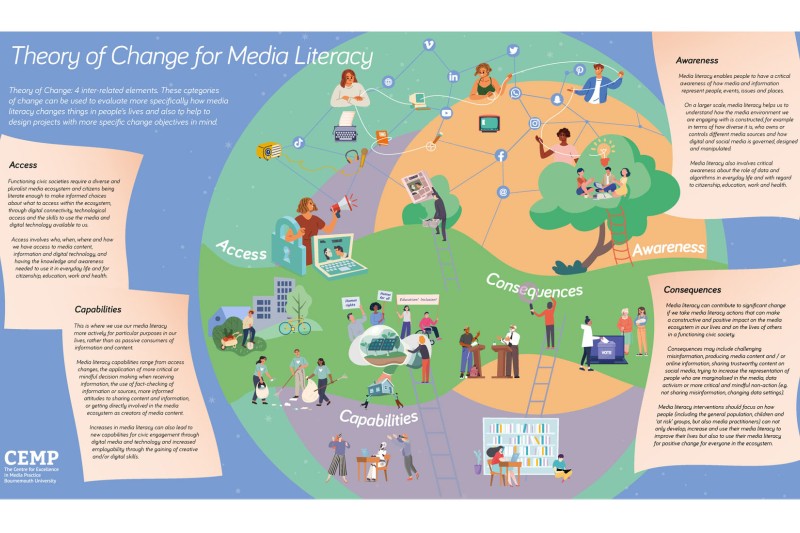Media literacy is the ability to engage fully with media in our connected daily lives. This means engaging with media safely and healthily, critically and actively, with positive social consequences.
This project, led by a team from Bournemouth University in partnership with the Media and Information Literacy Alliance, uses a theory of change to measure the difference media literacy makes to people’s lives.
This will include the way people engage differently with media, changes to their media behaviours, and how they use their media literacy for positive actions in the world.
A key shift in thinking, this recognises that reducing online harms in the UK needs not only a more media literate population, but also for media literate citizens to take positive actions in the digital environment, thereby improving the health of the media ecosystem.
The project has been funded by the Department for Digital, Culture, Media and Sport (DCMS), as part of the UK government's Online Literacy Media Strategy, which aims to empower people to stay safe online by being able to critically evaluate what they see and read on the internet.
What difference does media literacy make?
This project meets the urgent need for the independent, consistent and robust evaluation of media literacy projects. It provides a stronger understanding of ‘what works’ through a theory of change which goes beyond assessing levels of media literacy to measure sustainable positive consequences of media literacy in different contexts.
As a result, we have produced a transferable and sustainable framework and methodology that can not only be used for the independent evaluation of media literacy projects but also to inform their future design.
View our visual diagram of the Theory of Change for Media Literacy (PDF, 584kb)
Professor Julian McDougall
Project lead
Our theory of change and evaluation framework goes further than any media literacy metrics in the UK have before because our four elements can account for the who, why, what and how of media literacy and, crucially, with what results for society?
Our theory of change is aligned with the Media and Information Literacy Alliance framework’s five lifelong aspirations, for media literate people to be informed; empowered; healthy; socially conscious and connected.
We have designed a new media literacy evaluation framework for DCMS using our theory of change for the agentive and consequential uses of media literacy, measuring the impact of project on four elements:
- Full and safe access to digital technology and media,
- Critical awareness of media representations and what content and information can be trusted
- The capability to use media literacy actively, rather than as passive consumers
- The critical understanding of the consequences of actions in the media ecosystem and how to use capabilities for positive consequences
Our evaluation approach measures the impacts of projects in terms of the difference media literacy makes to people’s lives, the way people engage differently with media, changes to their media behaviours and how they use their media literacy for positive actions in the world.
Project outputs
- A robust evaluation framework and guide, aligned with a holistic theory of change for measuring the impact of media literacy projects
- A review of recent, existing and current UK media literacy projects (supported by DCMS and others), using the evaluation framework and theory of change
How to use the Theory of Change for Media Literacy
If you want to use this theory of change to design or to evaluate your media literacy project you can download our guide and watch our video that guides you through the process step by step:
Evaluating Media Literacy with a Theory of Change Guide (PDF, 3mb)
This instrument can be used in combination with the OFCOM Making Sense of Media’s Evaluation Toolkit – a series of how-to guides for media literacy interventions.
